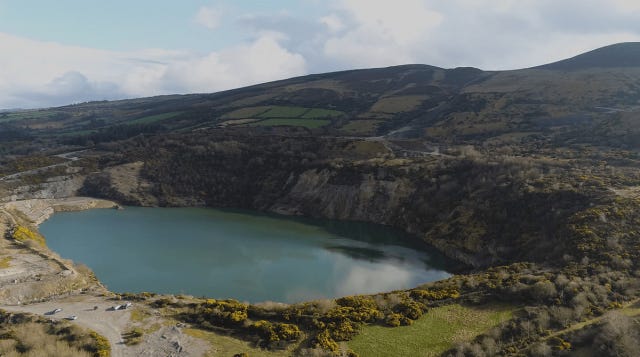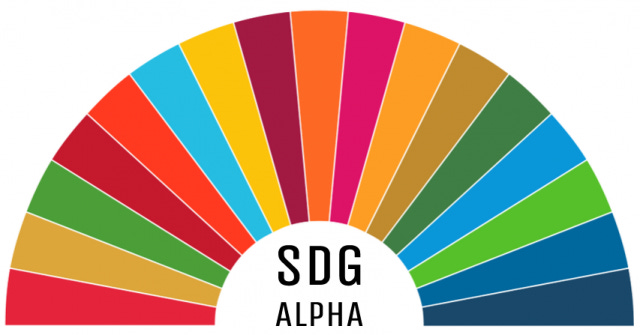SDG Alpha - Issue 56
Hello friend, and welcome to SDG Alpha, a fortnightly newsletter about Innovation, Impact Investing, and Sustainability in Ireland.
If you’re not a subscriber, and you want to keep getting the latest news and analysis delivered straight to your inbox every second Friday, sign up here.
As ever, thank you for reading; now, let's begin.
Good morning.
This issue there’s no sermon, or analysis, or “David Shares His Thoughts”: the only message I’m delivering to you in these opening remarks is…
APPLY FOR ACCELERATE GREEN.
That’s it. That, as we used to say, is the Tweet.
Launched by Bord na Móna in 2021, it remains the only scaling accelerator in Ireland to be exclusively focused on sustainability. Over three editions of the programme, we’ve worked with 25 innovative Irish companies, to help them identify and validate growth opportunities in the green and low-carbon economies. All of these companies make a positive contribution to the many ways we can decarbonise our lives, from reducing food waste in commercial kitchens, to converting diesel-burning off-road vehicles to battery or hydrogen fuel sources. On average, companies in the Accelerate Green portfolio have increased their revenues by 150% since completing the programme, and they have collectively created more than 80 new jobs.
We’re extraordinarily proud in Resolve Partners of what we’ve created, and we can see that the impact of what these companies have already achieved is more far-reaching than commercial and employment growth. The companies in the Accelerate Green portfolio inspire us with their visions for a better future, and with their willingness to grow, learn, and help others find a way forward.
I’m very excited to see what challenges our future cohorts will address. If you think your company should be among them, or you know someone who could benefit from the support of the programme, get that application in today!
Here’s the news round-up for Issue 56:
It’s very satisfying to be able to harp on about how wonderful our Accelerate Green portfolio is, and then to be able to share details of a new funding announcement from one of them 😊 Positive Carbon, who were a participant in the first cohort of the programme, have announced details of a new fundraise of €2.3M, led by BVP. The funding will be used to scale Positive Carbon’s food waste reducing solution to commercial kitchens across the UK and EU markets.
Let’s roll on with the investment and commercial updates - there’s a torrent of energy infrastructure announcements in this issue. First, ISIF, the strategic investment wing of Ireland’s sovereign wealth manager, announced they are allocating €94M into Octopus Energy Generation’s Sky Fund. The Sky Fund has now received commitments in excess of £1Bn, which will be used to support the development of new renewable energy projects.
And sticking with the topic of those cephalopod-themed venture capitalists, Octopus Energy also announced an investment in Ireland’s Verde Energy Group, as they build out a 100 MW portfolio of solar projects.
Foresight Energy Infrastructure Partners, a UK-based investor in green energy transition projects, announced that they are funding the development of an enormous pumped-storage hydro project, to be located on the site of a former mine in the Silvermines Mountains. To date, there’s only one operating pumped-storage facility in Ireland, at Turlough Hill in Wicklow; the new Silvermines project will add an additional 360 MW of capacity onto our grid.
Source Galileo, a Dublin-based renewable energy development company, announced they have secured investment from Ingka Investments; Ingka will acquire a 20% stake in Source Galileo’s wind portfolio, including the planned Mac Lir farm on Ireland’s south east coast.
In an update to the Kestrel Project, which is investigating the viability of storing green hydrogen in exhausted Kinsale Head gas reservoirs, Bord Gáis Energy has joined with the original project collaborators, ESB and dCarbonX.
EDF Renewables Ireland, the Irish wing of France’s national energy utility, announced plans to develop a new 30 MW wind farm in Roscommon.
Tirlán, the dairy producer formerly known as Glanbia, have announced an expansion of their successful FarmGen offering, bringing Dairygold in as a new partner in the scheme. FarmGen allows dairy farmers a streamlined way to bring solar PV onto their farms, lowering costs and emissions.
And this unexpected combination of cattle and carbon is a neat segue into this piece of equally unlikely news: beef baron Larry Goodman has been confirmed as the new owner of Barryroe Offshore Energy, the beleaguered oil and gas exploration company. The new investment will see Barryroe switch from fossil to green energy projects, funded by Goodman’s injection of €6M.
Final piece of renewable energy news, and worrying signs that Ireland’s project investors and developers aren’t immune from the significant financial challenges being seen across the globe: Mainstream Renewable have announced significant cost cuts, with rising expenses and pauses to some South American projects being cited as the cause of their woes.
Switching gears, and it’s great to see Irish waste management technology giant AMCS continuing their global expansion: the Limerick HQ’d firm announced the acquisition of FigBytes, a Canadian-based provider of ESG reporting tools.
Konree, the Galway-based aquatech start-up seeking to address the challenge of sea lice infestations in fish farms (yup, lice - I bet you’re scratching now), have been accepted onto the Synergist EIC programme, a pathway to the EIC Accelerator which can provide up to €2.5M in first-stage funding. I featured an interview with Konree’s founder Margaret Rae back in Issue 37, which is worth going back to have a read of.
A new all-island project to promote the use of bio-based materials and products has been launched, with a broad consortium of partners involved: BioDirect brings together the Circular Bioeconomy Cluster South-West, the Irish Nutrient Sustainability Platform (INSP), Ulster University, and the Advanced Technology in Manufacturing (ATIM) cluster.
Two events to mention quickly: tomorrow, if you’re around Dun Laoghaire, head along to Climate Fresk in the Lexicon. The Fresk is a 3-hour workshop, very hands-on and interactive, designed to raise awareness and understanding among the public about climate change; next, Enterprise Ireland host their Offshore Wind Forum 2023 on November 28 - strong line-up, with a very broad representation of all aspects of the industry.
Now, at the risk of being accused of being biased about my home county (guilty as charged), County Clare is home to one of my favourite social enterprises, Common Knowledge. With a focus on preserving and expanding knowledge of the practical skills required to maintain a sustainable lifestyle, Common Knowledge recently published their schedule of courses and workshops for 2024: if you’ve ever felt the need to build a mobile chicken coop (the marvellously nicknamed Chickshaw), look no further.
Finally, they’re multiplying, and there’s fewer and fewer obstacles to check their growth. Coming to a beach near you in the near future: jellyfish.
To close out the issue, it's time for "Three, Sixty", where we pose three questions on the theme of sustainability to an impact entrepreneur or innovator, to get a better understanding in sixty seconds of how they're working to achieve the SDG targets. For Issue 56, I chatted with Dr. Angie Nagle, co-founder at BladeBridge, an early-stage startup repurposing decommissioned wind turbine blades into cycleway bridges and public structures.
On a personal level, what impacts of the climate crisis are you most concerned about?
As a parent, I'm most concerned that my children will experience food shortages due to the climate crisis. And I'm concerned for all the families who are already experiencing food shortages and conflict due to displacement from extreme weather.
Which of the UN SDGs did you start BladeBridge to address?
BladeBridge repurposes discarded wind turbine blades into sustainable infrastructure. We're a two-sided business, helping the wind energy sector reduce its waste, while providing low carbon infrastructure for county councils and local communities. Initially, I started BladeBridge with the aim to decouple renewable energy generation (SDG 7) from the production of waste (SDG 12). A second effect of our two-sided business is that BladeBridge builds lower carbon sustainable infrastructure such as cycling bridges, thereby supporting SDG 11 (Sustainable Cities and Communities) without a negative impact on SDG 13 (Climate Change).
How does your business model enable the transition to a low carbon, or more sustainable future?
Ireland is relying heavily on meeting renewable energy targets through the expansion of wind energy capacity. We can help make Ireland and Europe's wind energy generation more circular by repurposing the blade material, which currently is not being recycled. Using this 'waste' material to substitute high carbon raw materials such as steel girders for bridges, reduces the carbon footprint of this infrastructure. This infrastructure then supports the transition to lower carbon travel. So, we are supporting the effort to both develop lower carbon energy, as well as lower carbon sustainable transport.
And, that's a wrap for Issue 56 of SDG Alpha! I hope you found it useful, and as always, if you did, please let us know, and don't forget to share! :)
Stay safe.







